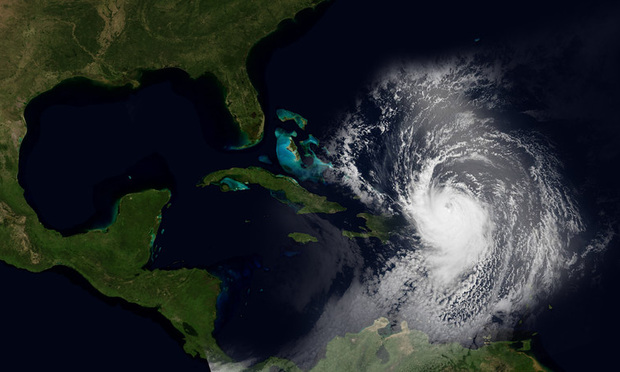Miami Judge Denies Attorney Fees to Keys Plaintiff Suing Flood Insurer
The judge ruled the homeowner's estate was not entitled to recover fees under the Equal Access to Judgment Act in a breach-of-contract suit, rejecting a contrary decision by another federal court in Florida.
August 19, 2019 at 12:00 PM
3 minute read
 A federal judge in Miami ruled a Florida Keys plaintiff was not entitled to recover fees under the Equal Access to Judgment Act in a suit against a flood insurer, rejecting a contrary decision by another federal court in the state.
A federal judge in Miami ruled a Florida Keys plaintiff was not entitled to recover fees under the Equal Access to Judgment Act in a suit against a flood insurer, rejecting a contrary decision by another federal court in the state.
After property in Islamorada owned by the estate of Raymond K. Hampson was damaged by Hurricane Irma, the estate’s personal representative, Timothy R. Hampson, sued Wright National Flood Insurance Co., which issued a standard flood insurance policy covering the property.
Hampson sought entry of a judgment against Wright for breach of contract. He also sought attorney fees, costs and case expenses incurred in filing and prosecuting the action, which he claimed were payable under the Equal Access to Judgment Act.
Wright moved to dismiss the claims for fees, costs and expenses under the law, arguing the expenses were not recoverable in a claim under a standard flood policy against Wright, a write-your-own insurance carrier.
The district court granted the motion.
In its decision, the court explained that a party may recover attorney fees and costs under the EAJA as the prevailing party in a case “brought by or against the United States … unless the court finds that the position of the United States was substantially justified.”
The court said the statute defined United States to include “any agency and any official of the United States acting in his or her official capacity.”
The court then ruled that attorney fees were not recoverable under the EAJA in cases of breach of a flood policy brought against a WYO program insurance carrier participating in the National Flood Insurance Program because WYO carriers were “not considered ‘agencies’ under the EAJA.”
The court rejected Hampson’s reliance on Arevalo v. American Bankers Insurance , decided in the Middle District of Florida in June, to support his arguments that attorney fees and costs were warranted. In Arevalo, the court found it was “not so much whether American Bankers is an ‘agency’ of the United States under the Act. Rather, it seems to matter more whether the government is the source of the funds or who would pay an award of attorney’s fees” and concluded it was “at least plausible at this point in the litigation that attorney’s fees may be paid from federal funds.”
U.S. District Judge K. Michael Moore in Hampson’s case said that it disagreed with the Arevalo decision and declined “to depart from the case law” finding that a WYO carrier was not an agency of the United States as required by the EAJA.
Accordingly, the court dismissed Hampson’s claims for attorney fees, costs and expenses pursuant to the EAJA.
The case is Hampson v. Wright National Flood Ins. Co., No. 4:19-cv-10083-KMM (S.D. Fla. Aug. 12, 2019).
Steven A. Meyerowitz, a Harvard Law School graduate, is the founder and president of Meyerowitz Communications Inc., a law firm marketing communications consulting company. Meyerowitz is the Director of the Insurance Coverage Law Center and editor-in-chief of journals on insurance law, banking law, bankruptcy law, energy law, government contracting law, and privacy and cybersecurity law, among other subjects. Contact him at smeyerowitz@
This content has been archived. It is available through our partners, LexisNexis® and Bloomberg Law.
To view this content, please continue to their sites.
Not a Lexis Subscriber?
Subscribe Now
Not a Bloomberg Law Subscriber?
Subscribe Now
NOT FOR REPRINT
© 2025 ALM Global, LLC, All Rights Reserved. Request academic re-use from www.copyright.com. All other uses, submit a request to [email protected]. For more information visit Asset & Logo Licensing.
You Might Like
View All
South Florida Real Estate Lawyers See More Deals Flow, But Concerns Linger
6 minute read
Vedder Price Shareholder Javier Lopez Appointed to Miami Planning, Zoning & Appeals Board
2 minute read
Real Estate Trends to Watch in 2025: Restructuring, Growth, and Challenges in South Florida
3 minute readTrending Stories
- 1States Accuse Trump of Thwarting Court's Funding Restoration Order
- 2Microsoft Becomes Latest Tech Company to Face Claims of Stealing Marketing Commissions From Influencers
- 3Coral Gables Attorney Busted for Stalking Lawyer
- 4Trump's DOJ Delays Releasing Jan. 6 FBI Agents List Under Consent Order
- 5Securities Report Says That 2024 Settlements Passed a Total of $5.2B
Who Got The Work
J. Brugh Lower of Gibbons has entered an appearance for industrial equipment supplier Devco Corporation in a pending trademark infringement lawsuit. The suit, accusing the defendant of selling knock-off Graco products, was filed Dec. 18 in New Jersey District Court by Rivkin Radler on behalf of Graco Inc. and Graco Minnesota. The case, assigned to U.S. District Judge Zahid N. Quraishi, is 3:24-cv-11294, Graco Inc. et al v. Devco Corporation.
Who Got The Work
Rebecca Maller-Stein and Kent A. Yalowitz of Arnold & Porter Kaye Scholer have entered their appearances for Hanaco Venture Capital and its executives, Lior Prosor and David Frankel, in a pending securities lawsuit. The action, filed on Dec. 24 in New York Southern District Court by Zell, Aron & Co. on behalf of Goldeneye Advisors, accuses the defendants of negligently and fraudulently managing the plaintiff's $1 million investment. The case, assigned to U.S. District Judge Vernon S. Broderick, is 1:24-cv-09918, Goldeneye Advisors, LLC v. Hanaco Venture Capital, Ltd. et al.
Who Got The Work
Attorneys from A&O Shearman has stepped in as defense counsel for Toronto-Dominion Bank and other defendants in a pending securities class action. The suit, filed Dec. 11 in New York Southern District Court by Bleichmar Fonti & Auld, accuses the defendants of concealing the bank's 'pervasive' deficiencies in regards to its compliance with the Bank Secrecy Act and the quality of its anti-money laundering controls. The case, assigned to U.S. District Judge Arun Subramanian, is 1:24-cv-09445, Gonzalez v. The Toronto-Dominion Bank et al.
Who Got The Work
Crown Castle International, a Pennsylvania company providing shared communications infrastructure, has turned to Luke D. Wolf of Gordon Rees Scully Mansukhani to fend off a pending breach-of-contract lawsuit. The court action, filed Nov. 25 in Michigan Eastern District Court by Hooper Hathaway PC on behalf of The Town Residences LLC, accuses Crown Castle of failing to transfer approximately $30,000 in utility payments from T-Mobile in breach of a roof-top lease and assignment agreement. The case, assigned to U.S. District Judge Susan K. Declercq, is 2:24-cv-13131, The Town Residences LLC v. T-Mobile US, Inc. et al.
Who Got The Work
Wilfred P. Coronato and Daniel M. Schwartz of McCarter & English have stepped in as defense counsel to Electrolux Home Products Inc. in a pending product liability lawsuit. The court action, filed Nov. 26 in New York Eastern District Court by Poulos Lopiccolo PC and Nagel Rice LLP on behalf of David Stern, alleges that the defendant's refrigerators’ drawers and shelving repeatedly break and fall apart within months after purchase. The case, assigned to U.S. District Judge Joan M. Azrack, is 2:24-cv-08204, Stern v. Electrolux Home Products, Inc.
Featured Firms
Law Offices of Gary Martin Hays & Associates, P.C.
(470) 294-1674
Law Offices of Mark E. Salomone
(857) 444-6468
Smith & Hassler
(713) 739-1250







